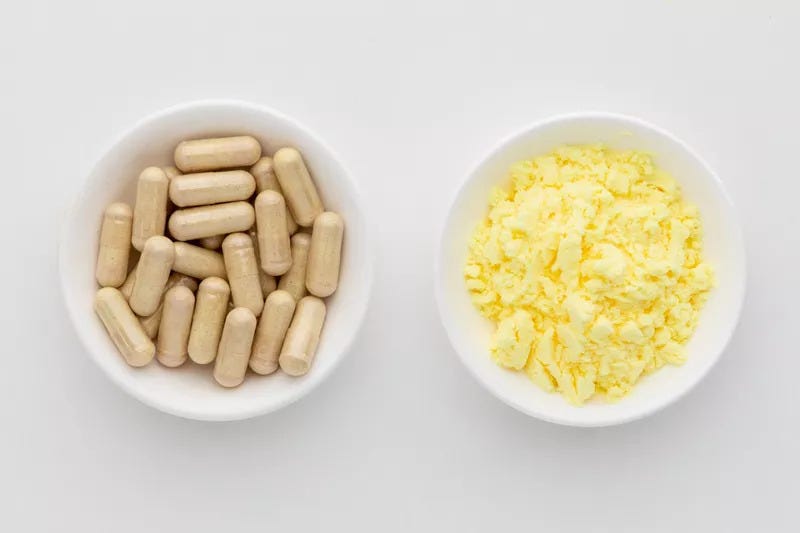
Alpha-lipoic acid is an antioxidant present in food and produced naturally in the body. It is utilized to degrade carbohydrates and generate energy.
Its primary function is to employ oxygen to convert blood sugar (glucose) into energy, a process known as aerobic metabolism. Being an antioxidant ALA neutralizes harmful additives known as free radicals that cause genetic damage to cells.
Foods containing alpha-lipoic acid include red meat, carrots, beets, spinach, potatoes, etc. ALA supplements are also available. Because alpha-lipoic acid appears to act as an antioxidant, it may safeguard the brain and be beneficial in certain liver diseases.
Benefits of Alpha Lipoic Acids
ALA is important in the management of numerous lifestyle diseases and may even prevent them. Here are a few of the most common alpha lipoic acid benefits.
1. Diabetes
ALA appears to have potential perks in the prevention of diabetes and is accredited as part of a diabetic treatment plan in some nations. According to research, Alpha lipoic acid supplements may play an important role in enhancing insulin resistance and thus lowering blood sugar in people with type 2 diabetes. The compound may also alleviate the symptoms of nerve damage that are prevalent in diabetics.
Because it has insulin-mimetic activity, it strengthens glucose handling and consumption. In type II diabetes patients, along with overweight adults, ALA lowers blood glucose and improves insulin sensitivity.
2. Skin Health
ALA’s antioxidant properties make it extremely beneficial to your skin. One of the most significant alpha lipoic acid benefits for skin is the reduction of wrinkles and fine lines near the lips and eyes. The application of ALA can protect the skin from the sun’s UV rays and decrease oxidative damage caused by environmental exposure.
It also helps in the reduction of skin damage caused by cigarette smoking. Tobacco use creates oxidative stress on the skin. Oxidative stress produces a large number of free radicals, which drive the aging procedure of the skin. The anti-inflammatory and anti-oxidative properties of ALA help in the reduction of the overall damage.
3. Powerful Antioxidant
Alpha Lipoic Acid is an extremely powerful antioxidant. It prevents the body from cell damage and aids in the recovery from oxidative stress. ALA assists the body in combating the effects of free radicals and aids in the reduction of aging side effects, particularly on the skin and muscles.
4. Preserves Bone Density
Another area where lipoic acid continues to improve is in preventing bone loss associated with osteoporosis and other degenerative bone situations. This multifaceted agent may benefit bone health preservation by reducing oxidative stress, which threatens to degrade healthy bone density.
Lipoic acid prevented the growth of bone-degrading osteoclast cells in a dose-dependent manner when implemented to bone marrow cells and osteoblasts (bone-forming cells) in the laboratory. It also slowed the inflammatory-induced bone loss process in both laboratory and living systems.
5. Migraine
Migraines and mitochondrial dysfunction have indeed been connected to oxidative stress. In both cases, lipoic acid is advantageous. Lipoic acid and topiramate combined were significantly more effective than either drug alone in reducing the frequency and duration of migraines.
Which ALA form is the most effective?
Broccoli, spinach, yams, and potatoes are the best sources of ALA. However, it appears that the food sources do not massively increase the body’s Alpha Hydroxy Acid (AHA) levels.
Few people take ALA supplements intending to increase AHA levels. Since some research findings do verify that 30% to 40% of ALA supplements are effectively absorbed by the body. When taken on an empty stomach, ALA is more easily absorbed by the body.
Conclusion
ALA is an organic compound that functions as an antioxidant as well as having a number of other benefits for the body. While the body produces it naturally, some people prefer to take ALA supplements.
It improves nerve function and slows the progression of memory loss. If you believe you are not getting enough ALA from your diet, consider taking ALA supplements to maximize your lipoic acid benefits.


0 comments:
Post a Comment